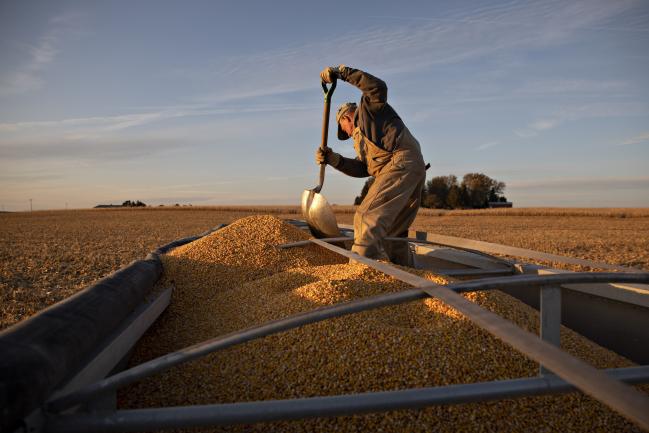(Bloomberg) --
A growing number of countries are signing pledges to resist export controls and other barriers to the movement of food and other necessities during the Covid-19 pandemic. But some countries are leaning in the other direction.
- Kazakhstan, one of the world’s biggest shippers of wheat flour, just banned exports of that source of flour along with others, including carrots, sugar and potatoes.
- Vietnam’s customs department reportedly ordered a stop to rice exports Tuesday to ensure domestic food security.
- Serbia has stopped the flow of its sunflower oil and other goods.
- Russia, the biggest player on the global grain market, is leaving the door open to shipment bans and said it’s assessing the situation weekly.
They’re just a few examples, and as Bloomberg’s Isis Almeida and Agnieszka de Sousa report this week, there are no clear signs the trend that will grow more widely. But wheat prices in Chicago have rallied in the past week on hoarding concerns, a gentle reminder that bread has emerged throughout history as a symbol of despair when supplies run low and people get hungry.
So what’s happening raises a question: Is this the start of a wave of food protectionism that will further disrupt supply chains and trade flows?
“Given the problem that we are facing now, it’s not the moment to put these types of policies into place,” said Maximo Torero, chief economist at the UN’s Food and Agriculture Organization. “On the contrary, it’s the moment to cooperate and coordinate.”
The crisis has forced many governments to reevaluate their domestic food stockpiles. India says it will have enough grain stockpiles to feed its poor for at least a year-and-a-half as reserves. China, the world’s biggest producer and consumer of rice, has revamped its pricing policy for the staple, and pledged to buy a record amount from this year’s harvest.
Despite images of some empty grocery shelves and panicked shoppers, global warehouses are stuffed with food. But as the virus complicates shipping logistics around the world and slows commodity exports, the question becomes whether food nationalism catches on and nations add the complication of keeping supplies for themselves.
As UN World Food Programme Chief Economist Arif Husain put it in a recent article online, “the economic consequences of this disease could end up hurting more people than the disease itself.”
Charting the Trade Turmoil
The European Union, the world’s biggest trading bloc, unblocked the membership path for North Macedonia and Albania, restoring its Balkans enlargement strategy after overcoming a French barrier.
Today’s Must Reads
- Tariff delay | The Trump administration is debating whether to give importers a three-month break from paying tariffs on some imported goods to help them cope with the trade disruptions.
- Parts problem | Surging demand for ventilators has laid bare the reality that the U.S. doesn’t just have a shortage of the machines — it doesn’t have enough parts needed to produce more.
- Back to life | While much of the world’s output is grinding to a halt, China is slowly emerging from its shutdowns by restarting production at factories and resuming some flights.
- Human touch | Governments have been quick to exempt food makers and distributors from lockdowns. Yet some workers are resisting over contagion fears, underscoring the balancing act needed to deliver essential goods and services.
- Factory shutdowns | Deere is suspending production in Brazil. Kia Motors is stopping assembly in West Point, Georgia. Two Fiat Chrysler workers in Michigan have died after testing positive for the virus.
- Testing kits | Go inside Puritan Medical Products’s Maine factory that’s racing against time to supply America with virus test swabs.
Bloomberg Analysis
- Washington’s response | Speed is the key in the U.S. fiscal package, according to Bloomberg Economics.
- European autos | Companies suspend production, and next may have to support their suppliers.
- Use the AHOY function to track global commodities trade flows.
- See BNEF for BloombergNEF’s analysis of clean energy, advanced transport, digital industry, innovative materials, and commodities.
- Click VRUS on the terminal for news and data on the coronavirus and here for maps and charts.
©2020 Bloomberg L.P.
